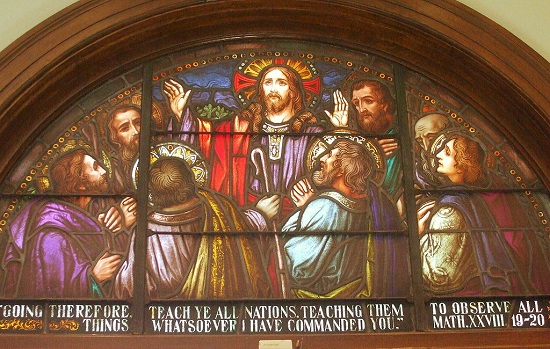The Great Commission misunderstood

[This is the first part of a multi-part post.]
There is a passage in the Bible that I have always had difficulty with. Since I decided to live with Jesus, it has been my greatest challenge: the last words that have come down to us from Jesus. It is what Jesus told his disciples at the time of his departure.
The Gospel of Matthew ends with Jesus calling his followers together for the last time. They meet on a mountain in Galilee, Jesus’ home. It is only a very brief meeting, and Jesus gets straight to the point. He walks up to his friends and says:
All authority in heaven and on earth has been given to me. Therefore go and make disciples of all nations, baptizing them in the name of the Father and of the Son and of the Holy Spirit, and teaching them to obey everything I have commanded you. And surely I am with you always, to the very end of the age.
(Matt. 28. 18-20; NIV)
We usually call this text the “Great Commission”; we understand it to mean the commission to evangelize. And that’s what put me under pressure every time this Bible passage was mentioned somewhere. Evangelism - that was simply not for me. And so, I often had a guilty conscience: I’m just not someone who can go out in the streets and preach to strangers.
I really tried to do that. In my youth, I attended a Bible school. This included two “missionary assignments”: One in Austria, and one in what was then Yugoslavia. I had consciously decided to do this because the Gospel, the good news of the loving Father God, was very important to me. And I hoped to somehow be able to tell people about it.
The beginning always was okay: I acted in a play about the life of Jesus. We performed it in pedestrian zones and campsites. I felt safe doing that. But when it came to addressing the audience personally, my self-confidence just wasn’t strong enough. I was stressed and always had a guilty conscience.
As a result, I avoided this Bible text. I wished it were not in the Bible. It took me 40 years to take the bull by the horns and dare to face this commission of Jesus. But then I almost couldn’t believe it: after all that time, I understood for the first time what Jesus was actually talking about here.
There are three things that Jesus asks of his followers:
- Make the people my disciples.
- Baptize them.
- Teach them to obey everything I have said to you.
Perhaps what Jesus means here is quite obvious to you. But I always misunderstood him. With me, this “Great Commission” came like this: “Go to all nations and make the people Christians”.
At Bible school, I had learned how to do this. To exaggerate a bit: The goal was to convince people to give their lives to Jesus. To do this, I first had to make it clear to them that they were not okay right now. That they were lost. Only when they had said a prayer of surrender to Jesus, they were Christians, and they were on the safe side. Then all I had to do was to encourage them to read the Bible and look for a church. And with that, I had accomplished my mission. (This might sound familiar to some Christians.)
I could never come to terms with this interpretation of Jesus’ last commission to his followers. My inner resistance was intangible to me for a long time. I had the vague feeling: this is actually no gospel, no really good news.
My point here is not that we should not talk to others about Jesus, on the contrary. If you get into a conversation with someone, if you tell them, as Peter puts it, about the hope that you have1 - and if they then ask you to pray for them, that’s great. If someone decides to put their life in Jesus’ hands, that’s wonderful. But that’s not what Jesus is talking about here.
What is he about? About discipleship.
People who are already his disciples are to make other people his disciples as well.
You may think, “Whether Jesus says, ‘Make disciples of men,’ or ‘Make Christians of men - that doesn’t matter. Christian or disciple actually mean the same thing.”
The problem is: Today, we usually no longer understand the words Christian and Disciple in the same way they meant 2000 years ago. And this leads to an interpretation of the “Great Commission” which is at least distorted, if not even wrong.
- What feelings does the “Great Commission” evoke in you?
- What do you understand when you hear the word “disciple”?
- Would it make a difference to you if Jesus had said, “make Christians”?
In the next part, we will look at what the first hearers of Matthew’s Gospel probably understood by the words Christ and Disciple. This can significantly change our view of this last commission of Jesus.
Cover image: Lyricmac at [English Wikipedia]. [CC BY-SA 3.0], via Wikimedia Commons.
-
see 1. Petr. 3, 15 ↩